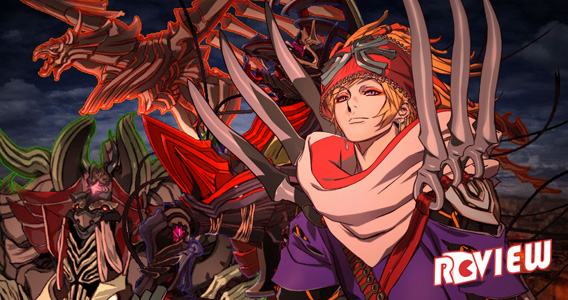
Moon Diver is an elevator ride that jolts as if the cable might snap at any moment while making quick stops at the bizarre, the surreal, and yes even something wanting for today’s secret word; esoteric.
The title was developed by feelplus with special guest, Strider creator Kouichi Yotsui, which is meant to mean something significant to those that played Strider so many years ago and perhaps were ever able to put a finger to the reasons they might have played it to death.
It’s not an easy point to nail down. Strider is a title often referenced by those creating 2D action titles in the here and now, those hoping to summon a connection to that release as a symbol of something eternal and pure and constant to the fundamental design of any old-school blade-swinging game worth your time and money.
It has to be a sense of control that such shout-outs hope to convince threads of commonality with – that your fingers will feel free for flinging a ninja across the screen, slicing through countless enemies in a sea of chaos while still discovering harmony and zen in the act.
But perhaps Moon Diver is about what the 2D action genre can offer when the man himself comes around, which at the very least is an easier matter to pick apart.
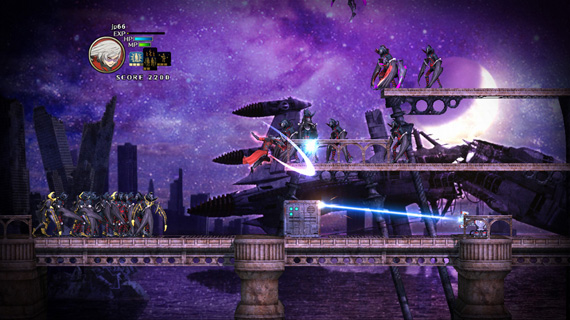
Those seeking the shelter of the sense and purpose found in traditional narrative direction should abandon all hope upon purchase. Moon Diver forces a vague trail of philosophical murmurings via static sequences that break apart chapters and offer little beyond a few moments for the player to slug more caffeine in hopes of readying their fingers for the escalating challenge of each new stage. There are twelve stages, across which the earth burns and legions of fairly generic killbots usher in an apocalypse while a solitary figure ponders existential questions like a Russian novelist making notes in a Soviet-era breadline.
The real story of Moon Diver is something I want to call environmentally driven narrative without slipping into hippie nonsense – if I mention digital jazz you are free to forward hate mail. But what I mean to pick at it with the wording is that Moon Diver only makes sense in the controls offered to the player, through stage designs that deceptively invite button mashing but require a keener eye for long term survival and success.
These stages vary wildly in scale and scope, at times offering straightforward runs, and quite often leading toward closed areas. Occasionally players fall through open skies hoping to land on the right spot before launching into another jump, and all the while a loose story progression might place them on city streets or the top of a naval vessel or even in space on a battle cruiser. But the priority of the level design is in creating ninja proving grounds, gymnasiums of endurance where stages don’t exist to serve a structured story nearly so much as simply to serve the ends of the controls. It’s only in the player’s potential appreciation of those controls that any story worth telling emerges.
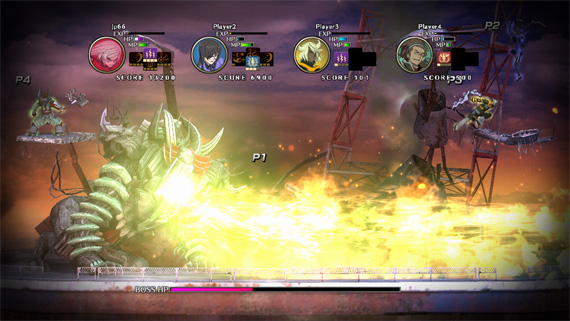
Four players are encouraged to accept the challenge locally or online, which won’t seem necessary to the solitary sort until they find themselves five or six stages deep and wanting for extra blades to cut through the building chaos.
Moon Diver offers both magical abilities and leveling, which gives players a chance to use special powers via their MP gauge to even the odds – healing, raising attack powers, temporally freezing or blinding enemies. Each stat upgrade allows the player to nudge the life, power, or MP gauges a hair higher for a chance at a few more seconds of life. In multiplayer sessions players can link the use of MP powers to create advantages, and should any one player exhaust their health, they can be saved by the others to offer an extremely important hand in reaching the end of the game – particularly as the stages amp up the merciless barrage of cheap tricking turrets and larger enemies that make death a near certainty.
As comforting as company is, hell does remain other people. Moon Diver introduces numerous areas that require coordination between potential strangers, and waiting on others, falling behind, or simply losing sight of safe ground provide consistent struggles.
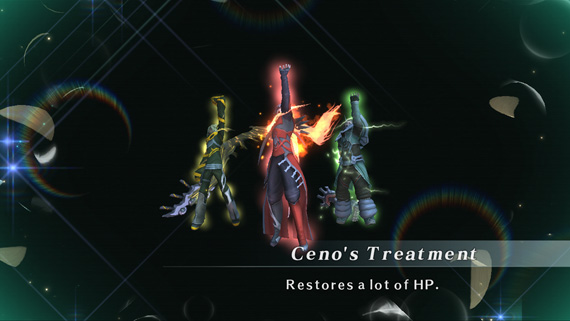
For a game I expected to be about very precise controls, where I can slice and roll and jump into the air to land a scissor like strike from above, there’s something to letting go that builds as I continued playing the game. Certainly there’s a strategy to slaying the endless hoards that fill the screen with varying degrees of difficulty, but the preferred multiplayer perspective makes it necessary to play the strategist on the fly.
There’s a want to pound the attack button when so many enemies fill the screen. But there’s a need to appreciate the way a jump or roll can slice at enemies, and how really managing your expanding MP powers makes this more than the simple slasher an initial glance might suggest it to be. At the same time, the rabbit hole the game offers is very old-school in the way that many will find value through the desperate act of searching it out to justify the purchase.
If you’ve ever played a game to death and come to appreciate it more because it was all you had to play, then you’re well prepared for Moon Diver, a title that would be just as easy to walk away from had you not spent fifteen dollars on it just now.
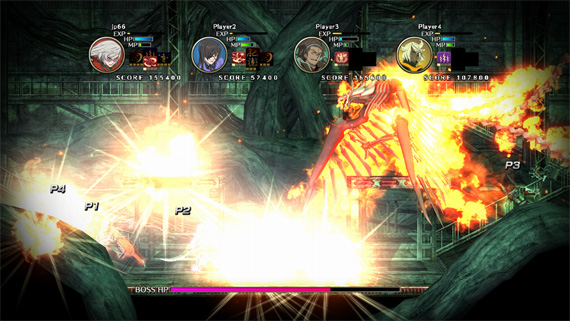
Moon Diver doesn’t easily conform to any expectations. The game is at times baffling, bizarre, and utterly frustrating. And somewhere in the playing is the irritatingly glorious, fresh and promising. Moon Diver is different, not for the sake of being so, but because it’s pushing the boundaries, that old paradigm shift I like to focus on so often.
Moon Diver doesn’t invite you to sit around the fire and hear a tale. It invites you to come around the circle to find and tell your own. It gets to the meat and potatoes of the matter of replaying to death, and suffers a lack of variety in the designs of enemies and stages in that regard. But it’s still one of the more interesting digitally distributed titles to make the rounds, assuming you’re willing to work to bring some sense to it on your own.
feelplus
Publisher
Square-Enix
System
PlayStation 3 (PSN), Xbox 360 (Xbox LIVE Arcade)
Modes
Singleplayer, Multiplayer
Release Date
March 29, 2011 PlayStation Network, May 4, 2011 Xbox LIVE Arcade
Price
$14.99 PSN, 1200 Points XBLA
*A copy of this title was provided by the publisher for review

Great review Jamie! I’m playing Moon Diver right now for a review over at ps3blog.net and I’m up to level 6 after a couple of hours. Enemy repetition is something that has always been part of hack and slash games but it’s usually not as apparent as in here since I’ve only seen 5 enemy types (not counting bosses). 4 player MP is something else entirely and at times it seems like the single player local play is the extra and the MP is the meat of the game…
Comment by EdEN — April 6, 2011 @ 1:27 am
I’ll probably skip this one if the MP is the meat and the SP is the extra… unless it goes to $5 (400 MS Points) at some point in the future. Bummer.
Comment by Ujn Hunter — April 6, 2011 @ 2:50 pm
It’s a weird mix really, I pushed through the game and stat grind in multiplayer, but I’ve also started going back through earlier stages now in single-player and spending more time digging through levels.
Comment by Jamie Love — April 6, 2011 @ 3:49 pm
Finding all the areas for the silver trophy should be interesting hehehe.
Comment by EdEN — April 6, 2011 @ 4:28 pm